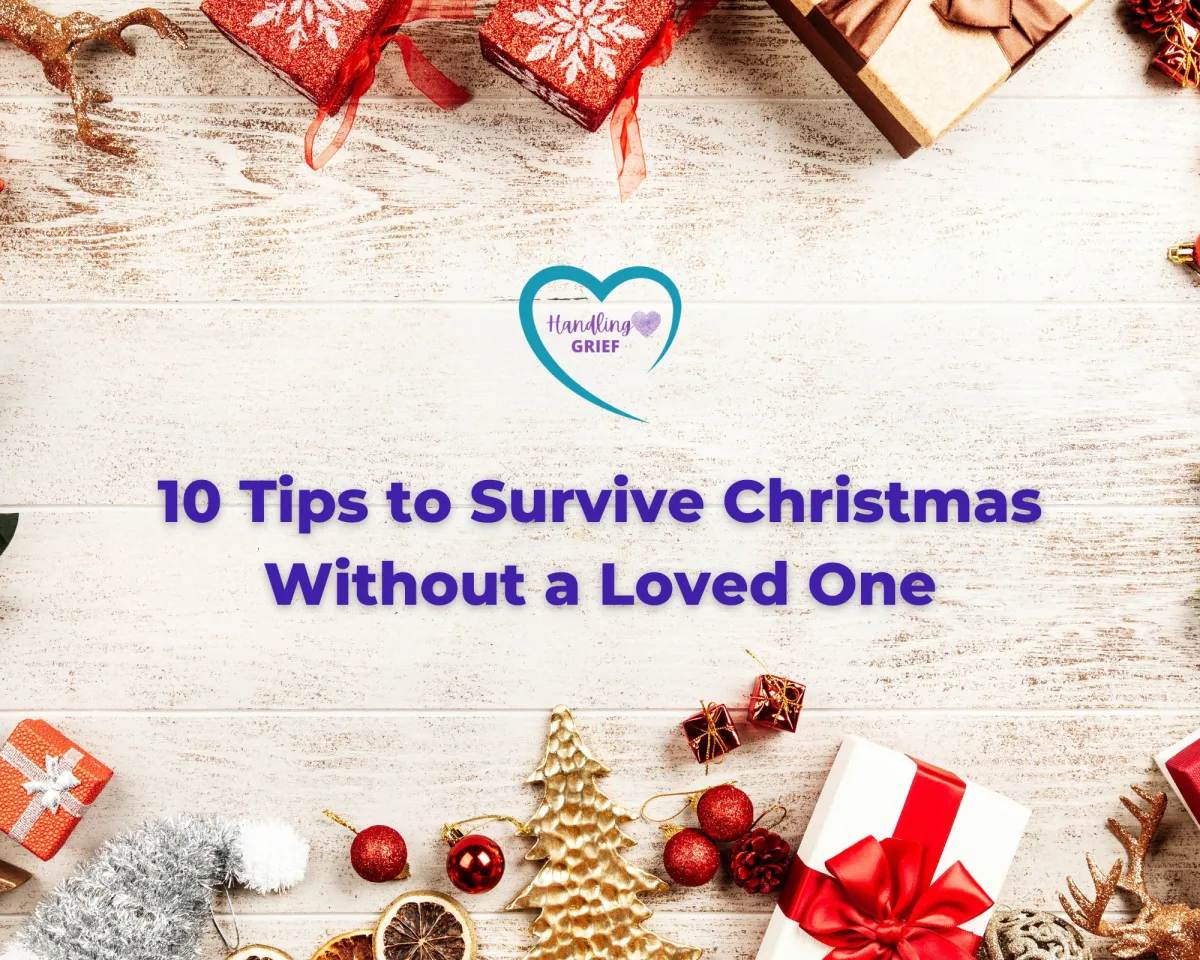Blog
Practical insights, honest reflections, and compassionate guidance for navigating grief and life's challenges. Here you'll find articles that help you understand what you're going through and give you tools to move forward with hope.

Handling Grief During the Holidays: 10 Tips to Survive Christmas Without a Loved One
Coping with grief during Christmas can feel incredibly lonely and emotionally overwhelming. The festive season is often filled with family traditions, joyful gatherings, and sparkling lights—but when you’re grieving, it can all feel like too much.
If you’ve lost someone you love, you might be wondering how to get through it all. You’re not alone. In this post, I’m sharing 10 gentle and practical tips to help you care for yourself, honour your grief, and find moments of calm during the Christmas season.
1. Talk About Your Grief
It’s okay to say you’re not okay.
Grief is a heavy burden to carry alone, especially during the holidays. Let trusted friends or family know how you're feeling. Talk about your loved one. Share memories. Laugh or cry together. Speaking openly helps others know how to support you—and gives them permission to share their feelings too.
You don’t need to pretend you’re fine. Let others know it might be a tough time for you, and that’s completely okay.
2. Keep Your Plans Flexible
Grief is unpredictable. Some days you might feel able to face the world, and other days even simple tasks can feel too much.
Try not to overcommit. If you’re not up for a big family gathering, suggest something smaller or lower-key instead—like a gentle walk, a video call, or simply being together without a big fuss.
Be kind to yourself. You’re allowed to change your mind. You don’t need to explain or justify your boundaries.
3. Prioritise Self-Care
When you're grieving, looking after yourself is not selfish—it’s essential.
Eat nourishing meals, get enough rest, and try to do small things that bring you a sense of comfort or peace. Don’t say yes to everything—especially if your heart’s not in it. It’s okay to step back and do what you need to heal.
Ask yourself, “What do I need right now?” Then give yourself permission to do that.
4. Limit Alcohol
It can be tempting to numb the pain with a few extra drinks, especially at festive gatherings—but alcohol often amplifies emotions and leaves you feeling worse the next day.
There are some lovely alcohol-free options available. I recently tried Fizzero from M&S, and it was a great alternative to Prosecco—refreshing, festive, and with no side effects.
Instead of reaching for a drink, try a calming activity: deep breathing, a walk outdoors, or a warm bath.
5. Do Things Differently
You don’t have to do Christmas the way it’s always been done.
Old traditions might feel too painful right now. And that’s okay. Change the scenery, simplify your plans, or try something new altogether. You’re not erasing the past—you’re creating space to care for yourself in the present.
Ask yourself: What feels manageable this year? And follow that.
6. Create New Traditions
You can still honour your loved one while creating something meaningful for where you are now.
That might be lighting a special candle in their memory, making their favourite dish, visiting a place they loved, or creating a photo board. Small rituals can help you feel close to them and offer a quiet moment of connection in the middle of the season.
7. Lend a Hand to Someone Else
Helping others can gently lift your perspective and remind you that you’re not alone.
Whether it’s volunteering at a local charity, offering to cook a meal for someone, or simply checking in on a neighbour—acts of kindness create purpose and connection.
This year, with our children spending Christmas elsewhere, we’re opening our home to others who would otherwise be alone. We're expecting about 12 guests—and I’m actually really looking forward to it.
Even the smallest gesture can mean the world to someone.
8. It’s OK to Be OK
Sometimes, in the middle of grief, you might find yourself smiling or even enjoying a moment—then feel a wave of guilt wash over you.
This is common. It doesn’t mean you’ve forgotten your loved one or that you’re moving on too quickly. It simply means you’re human, and joy and grief can coexist.
Let go of the guilt. Those moments of peace are part of your healing.
9. Look Ahead—Gently
You can’t change what’s happened, but you can choose how to respond moving forward.
The new year might feel like a blank page. Gently consider how you’d like to spend your time, who you want around you, and what small things could bring you joy or purpose. Create a vision for this next chapter that honours your grief but also gives space for hope.
If that feels too difficult, it may be a sign you need to tend to some unresolved pain before you can move forward. That’s okay too—healing takes time.
10. Try Journaling
Writing can be a powerful way to make sense of what you’re feeling.
Journaling gives you a private space to express what’s hard to say out loud, remember your loved one, and start processing your grief at your own pace. You don’t have to write every day—just start where you are.
You might like to:
Write a letter to your loved one
Reflect on how you're feeling today
Note down any comforting moments or memories
Set a gentle intention for the week
Journaling helps track your healing and reminds you how far you’ve come. It can be a quiet but powerful act of self-care.
A Gentle Gift for You
If you’re looking for a supportive tool to help you feel more grounded, I’d love to offer you my FREE Handling Grief Self-Care Journal. It’s a 30-day guide designed to help you build emotional resilience, reflect gently, and take small steps forward—at your own pace.
Normally available on Etsy, I’m sharing it as a gift with my readers, friends, and community.
👉 Click here to download your free journal
Final Thoughts
Christmas without someone you love can feel impossibly hard. But you don’t have to go through it alone—and you don’t have to have it all figured out.
With care, flexibility, and support, you can navigate this season in a way that feels right for you.
If you’d like to explore where you are in your grief journey, I invite you to read my article and take the Free Self-Assessment Quiz:
👉 Is Unresolved Grief Holding You Back?
Or, if you're ready for a more personal connection, you can also book a free discovery call. I'm here to listen, guide, and support you.
You’re not alone. And you’re doing better than you think.
Reference: Untangled Grief
Want to collaborate?
Let's talk. I'd love to hear how we can support each other.
Connect with me
Find me on social media or drop me a message. I'd be happy to connect and answer any questions you might have.
© Copyright 2026. Ghulam Fernandes. All rights reserved.

